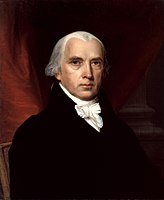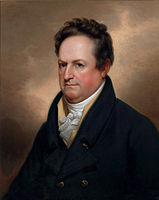1812 United States presidential election in Pennsylvania
Madison
50-60%
60-70%
70-80%
80-90%
90-100%
Clinton
50-60%
60-70%
The 1812 United States presidential election in Pennsylvania took place as part of the 1812 United States presidential election . Voters chose 25 representatives, or electors to the Electoral College ,[ 1] President and Vice President .
Pennsylvania voted for the Democratic-Republican candidate, James Madison , over the Federalist candidate, DeWitt Clinton . Madison won Pennsylvania by a margin of 25.2%.
Results
Note: Election results totals only include known numbers, as verified by the source . Vote totals from several counties are missing/unknown.
County results
County
James Madison
Democratic-Republican
DeWitt Clinton
Federalist
Total votes cast
%
#
%
#
Adams 35.47%
410 64.53%
746 1,156
Allegheny 59.96%
966 40.04%
645 1,611
Armstrong 70.35%
121 29.65%
51 172
Beaver [ 3] 62.37%
383 37.62%
231 614
Bedford 56.20%
721 43.80%
562 1,283
Berks 81.36%
3,025 18.64%
693 3,718
Bucks 49.03%
2,184 50.97%
2,270 4,454
Butler 79.96%
375 20.04%
94 469
Cambria 64.03%
89 35.97%
50 139
Centre 85.33%
1,239 14.67%
213 1,452
Chester 47.28%
2,788 52.72%
3,109 5,897
Crawford 74.64%
2,455 25.36%
834 3,289
Cumberland 63.29%
269 36.71%
156 425
Dauphin 77.10%
1,842 22.90%
547 2,389
Dauphin (late return)
95.56%
86 4.44%
4 90
Delaware 32.58%
592 67.42%
1,225 1,817
Erie 54.09%
152 45.91%
129 281
Fayette 83.60%
999 16.40%
196 1,195
Franklin 66.89%
1,513 33.11%
749 2,262
Greene 64.98%
425 35.02%
229 654
Huntingdon 51.11%
712 48.89%
681 1,393
Indiana [ 3] 62.27%
137 37.73%
83 220
Lancaster 39.32%
2,438 60.68%
3,762 6,200
Lehigh 82.53%
1,039 17.47%
220 1,259
Luzerne 36.41%
713 63.59%
1,245 1,958
Lycoming 72.38%
933 27.62%
356 1,289
Mercer 79.27%
367 20.73%
96 463
Mifflin 89.54%
1,053 10.46%
123 1,176
Montgomery 59.12%
2,623 40.88%
1,814 4,437
Northampton 80.10%
1,554 19.90%
386 1,940
Northumberland 85.14%
3,415 14.86%
596 4,011
Philadelphia 60.11%
6,987 39.89%
4,637 11,624
Susquehanna 82.76%
725 17.24%
151 876
Somerset 71.89%
422 28.11%
165 587
Venango & Warren 78.44%
131 21.56%
36 167
Washington 84.57%
2,334 15.43%
426 2,760
Wayne 74.44%
297 25.56%
102 399
Westmoreland 63.96%
818 36.04%
461 1,279
York 59.77%
2,090 40.23%
1,407 3,497
Source: [ 2]
See also
Notes
^ While commonly labeled as the Federalist candidate, Clinton technically ran as a Democratic-Republican and was not nominated by the Federalist party itself, the latter simply deciding not to field a candidate. This did not prevent endorsements from state Federalist parties (such as in Pennsylvania), but he received the endorsement from the New York state Democratic-Republicans as well.
References





